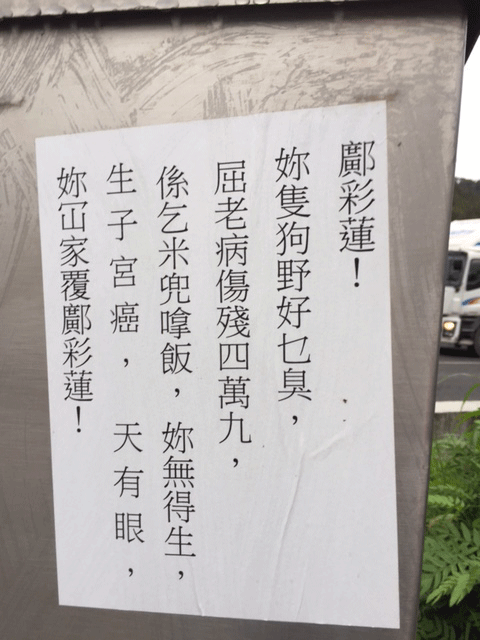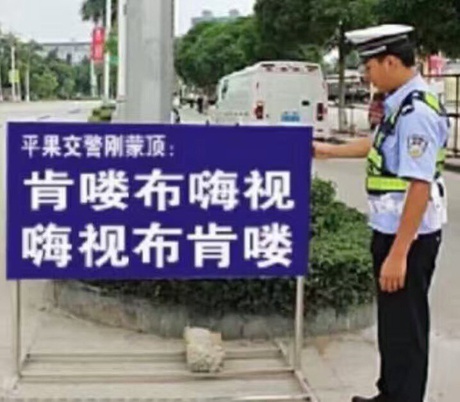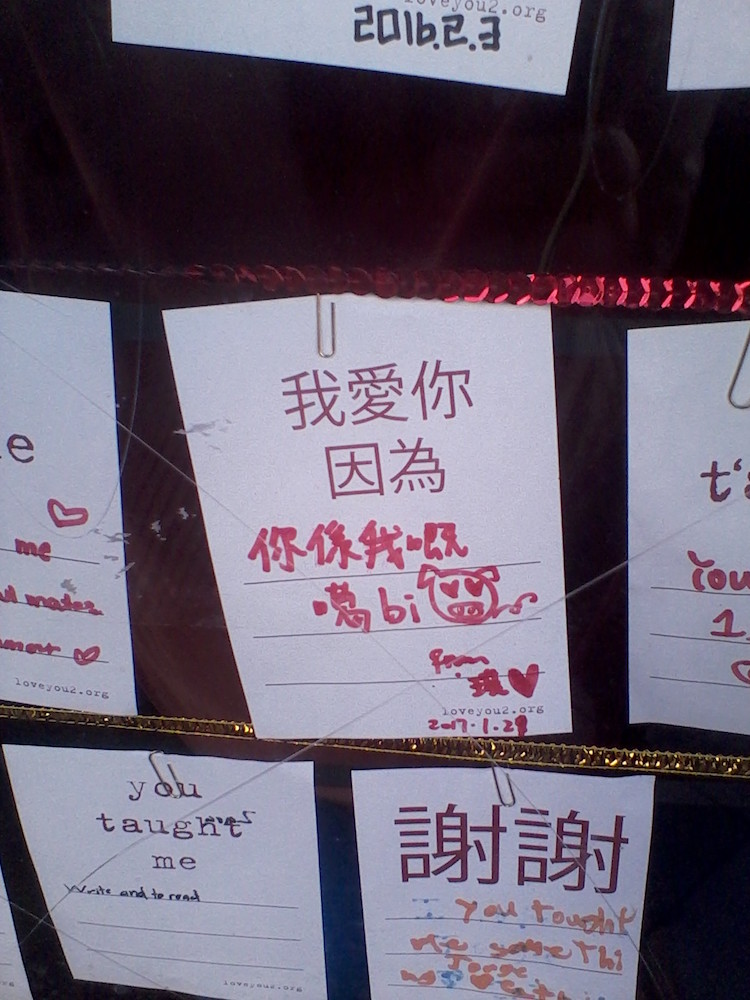Archive for Topolects
Cantonese sentence-final particles
Even if you don't know any Cantonese but listen carefully to people speaking it, you probably can tell that it has an abundance of particles. For speakers of Mandarin who do not understand Cantonese, the proliferation of particles, especially in utterance final position, is conspicuous. Non-speakers of Cantonese, confronted by all these aa3, ge3, gaa3, laa1, lo1, mei6, sin1, tim1, and so on naturally wonder why there are so many particles in this language, what are their various functions, why they are often drawn out (elongated), and how they arose.
Cantonese speakers, on the other hand, just take them in stride as a natural part of their expressive equipment and don't think that there is anything unusual about them.
Read the rest of this entry »
Topolectal traffic sign
This has apparently been around for awhile, but I'm seeing it now for the first time:
Read the rest of this entry »
Cantonese tones
If you ask Modern Standard Mandarin (MSM — Guóyǔ 國語 / Pǔtōnghuà 普通话) speakers how many tones there are in their language, most of them will tell you without much hesitation that there are four tones (1st, 2nd, 3rd, 4th) plus a neutral tone.
Chances are, however, if you ask a Cantonese speaker how many tones there are in their language, they will not give you a clear answer, or if they do, it will differ from what other Cantonese speakers claim. That has always been my experience over the years, but I just did a little survey to reconfirm my earlier impressions. The results are rather more amazing than I expected them to be:
Read the rest of this entry »
Wenzhounese in Italy
Commonly referred to as "Devil's language" (èmó zhī yǔ 恶魔之语), because it is considered by outsiders to be extraordinarily difficult, Wenzhounese (Wēnzhōu huà 温州话), the language of the city of Wenzhou in Zhejiang Province 230 air miles south of the Yangtze estuary, has been a topic of discussion on Language Log before:
"Devilishly difficult 'dialect" (8/20/15)
"Mutual unintelligibility among Sinitic lects" (10/5/14)
"Devil-language" (5/25/14)
"The enigmatic language of the new Windows 8 ads" (5/14/13)
"Mutual intelligibility" (5/28/14)
Read the rest of this entry »
Why learn Cantonese and one way to do it
Anne Henochowicz, who for years was a mainstay at China Digital Times, and whom I have often cited on Language Log, has decided to branch out from Mandarin and tackle another important Sinitic language, Cantonese.
Check out her new blog: "I'm Learning Cantonese: Teaching Myself a Second Chinese Language".
Read the rest of this entry »
Permalink Comments off
Why electronic machine translation services sometimes seem to fail
The inability of Google Translate, Microsoft Translator, Baidu Fanyi, and other translation services to correctly render jī nián dàjí 鸡年大吉 ("may the / your year of the chicken be greatly auspicious!") in various languages points up a vital distinction that I have long wanted to make, and now is as good a time as ever. Namely, just as you could not expect these translation services to handle Cantonese, Shanghainese, Taiwanese, etc. (unless specifically and separately programmed to do so), we should not expect them to deal with Literary Sinitic / Classical Chinese (LS / CC).
Read the rest of this entry »
The perils of pronunciation
Distinguishing between "four" and "ten" in rapid, slurred Modern Standard Mandarin (MSM) is not always easy: sì 四 vs. shí 十. Try saying sìshísì 四十四 ("forty-four") quickly and it starts to feel like the beginning of a tongue twister. Now, when speakers from the various topolects, even within the so-called Mandarin group, come together and tones, vowels, and consonants start flying off in all directions, things can become still hairier and sometimes even costly.
Read the rest of this entry »
Cantonese teachers influenced by Mandarin
[This is a guest post by Silas S. Brown]
It seems a few native Cantonese speakers employed in the production of Cantonese language courses are quite happy to read out Mandarin vocabulary with Cantonese pronunciation, rather than the actual native Cantonese versions of the words, and I can't help wondering why.
Read the rest of this entry »
Ken Liu reinvents Chinese characters
In "Inside the world of Chinese science fiction, with 'Three Body Problem' translator Ken Liu" (Quartz, 12/2/16), Nikhil Sonnad conducts an interview with the sci-fi author and translator of the Sān tǐ 三体 (Three-Body [Problem]) series by Liú Cíxīn 刘慈欣.
Read the rest of this entry »
Dialect death
Reports of the death of languages and the extinction of languages are alarmingly routine, but before a language dies out entirely, when it is endangered, its dialects die off one by one.
"Last native speaker of Scots dialect dies" (10/6/12)
Dialect Death: The case of Brule Spanish (1997)
The list of publications documenting the dead and dying dialects could go on for many pages: I lament each and every one of them.
Read the rest of this entry »
Language vs. script
Many of the debates over Chinese language issues that keep coming up on Language Log and elsewhere may be attributed to a small number of basic misunderstandings and disagreements concerning the relationship between speech and writing.
Read the rest of this entry »


